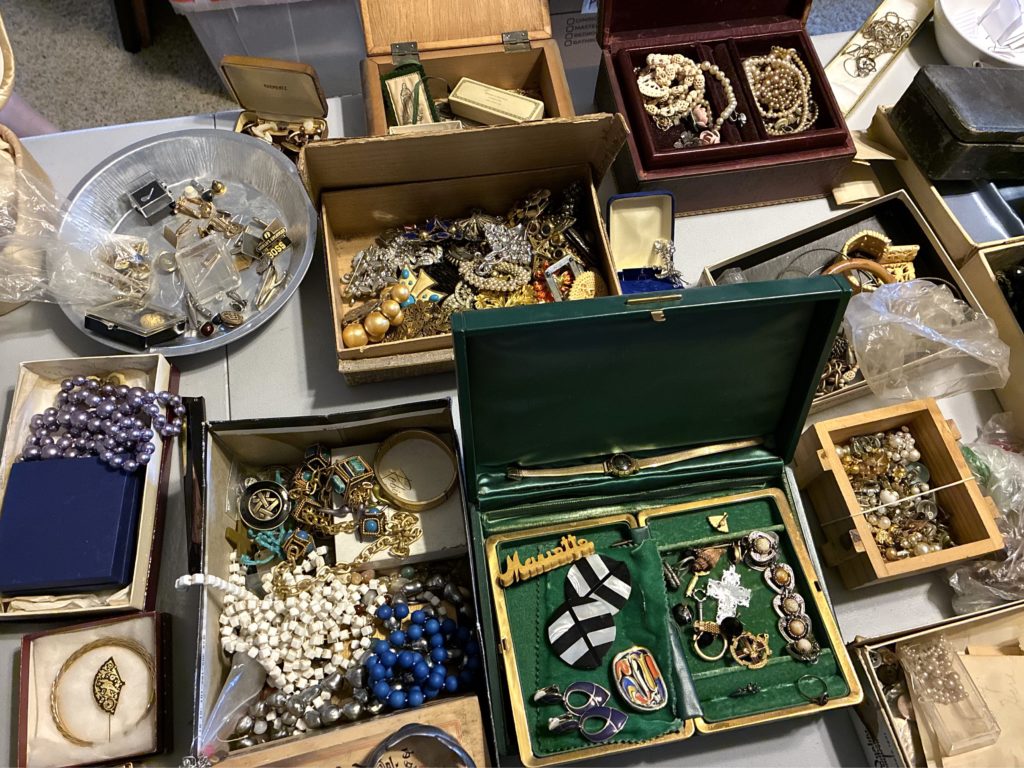When a well-meaning member of my parish heard that my wife’s family home had burned down in the Palisades Fire last January, his first response was, “It’s only stuff.”
This pious cliché doesn’t begin to address the loss of memories, of keepsakes, of records, of history that come with such destruction. “It’s only stuff” is about as consoling as a politician’s promise of “thoughts and prayers.”
But while my wife’s family reels from the still unfolding realization of all that was taken from them so unexpectedly and so cruelly, my family is dealing with an opposite challenge.
When my mother died in February, my siblings and I were left with the unenviable task of sorting through literally a century of stuff in her house. Although, as my surname suggests, my father’s lineage is Swedish, my parents apparently never encountered the principle of Swedish death cleaning, or döstädning. A book with that name by Margareta Magnuson was popular a few years back. Her oh-so-Swedish-minimalist argument is that we spare our descendants the burden of inheriting, tossing, or selling our stuff by dumping it ourselves or by giving it away before we die.
So, while my wife’s family is dealing with what was lost, my family has been dealing with what’s been found. Not just every Father’s Day and Mother’s Day card we ever gave our parents, but our report cards and medical records, our correspondence, mementos, and so much more. We found baby cards celebrating my birth, and cards celebrating my dad’s birth in 1918.
My parents’ home unwittingly had become a time capsule for our family, with everything from my parents’ high school and college report cards to a notebook with dance steps my mom had learned from an Arthur Murray Dance Studio before she ever met my dad. My dad’s letters home were all preserved by his parents, often in bound volumes. Also preserved were many of the letters his father wrote back to him.
My dad was a professor at Loyola Marymount University since 1946. He taught hundreds, perhaps thousands of students, and he saved class notes as well as blue mimeographed quizzes from all those classes. He also had copious files on virtually every major author of the last 200 years, including notes from his Harvard master’s program and his USC Ph.D. program. He apparently never threw out any of them.
Thus, it was my unenviable task to go through these files, all written in his exemplary script that I did not inherit, pulling off paper clips and leafing through the contents before depositing them in recycling bin after recycling bin.
I didn’t feel I was so much as purging as erasing — erasing the efforts of my father that chronicled a lifetime of studying and teaching. He was a teacher’s teacher, much more interested in igniting the imagination of his students than in doing scholarship for an obscure academic journal. As the historical record we uncovered made clear, he was an exemplary student, and he wanted to be an exemplary professor.
And while what my mother saved was not as academic, there was a rich history in what she preserved: personal calendars tracking every cold, every doctor’s visit, every special event of her eight children. She was also the recipient of stacks of china, glassware, and silver passed down from various ancestors, more stuff that ended up stuck away in a deep hallway closet and almost never used. All that stuff now has become our unwanted inheritance as well.
And looming over everything, literally, is our floor-to-ceiling bookcases with bound volumes of the works of virtually every 19th-century English author and many more besides. What does one do with the collected works of John Ruskin in an age when just reading a print newspaper seems a task beyond most mortals?
This long post-mortem of sifting and disposal has made me think about my stuff. For the apple has not fallen far from the tree. I have shelves of books (and thus, no room for my dad’s). I still have mementos from my grammar school days, and political bumper stickers from long-lost causes. I even have a drawer in which I’ve put all the Father’s Day and Birthday cards I’ve received from my own brood. It is a little treasure chest of love notes, yet I don’t go through and reread them ever.
It may be a poor excuse for clutter, but stuff matters. We invest it with meaning because it tells stories. Every scratch, every scrap, every image is a story waiting to be remembered, maybe to be shared. It may just be stuff, but we invest it with significance because it tells our tale. And as my siblings and I examine all the stuff we found in our parents’ house, it was as if our parents were telling us their tale one last time.

